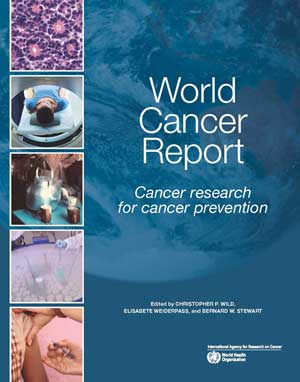History
 The first World Cancer Report, published in 2003, provided a concise assessment of current knowledge about cancer, specifically including the distribution of cancer worldwide, and understanding about the causation of cancer in particular communities or, if applicable, in all communities affected by a particular type of cancer (lung cancer, liver cancer, etc.). Also addressed were research findings indicating how cancer may be prevented.
The first World Cancer Report, published in 2003, provided a concise assessment of current knowledge about cancer, specifically including the distribution of cancer worldwide, and understanding about the causation of cancer in particular communities or, if applicable, in all communities affected by a particular type of cancer (lung cancer, liver cancer, etc.). Also addressed were research findings indicating how cancer may be prevented.
Publication of the first three World Cancer Reports, in 2003, 2008, and 2014, was based on assessments by scientists with outstanding reputations in their respective fields. Such mobilization of international expertise was based on the unique standing of the International Agency for Research on Cancer (IARC). For more than half a century, IARC has provided a basis on which scientists worldwide could strive for a common perspective of agents that cause cancer (through the IARC Monographs), of the pathology and genetics of different cancer types (through the WHO Classification of Tumours), and of how the incidence of cancer may be reduced (through the IARC Handbooks of Cancer Prevention). IARC has also been the means by which the global distribution of cancer has been determined (through the Cancer Incidence in Five Continents series and GLOBOCAN).
Previous World Cancer Reports have covered all such areas of knowledge by engaging hundreds of scientists from many countries to provide their expertise and perspectives. The challenge, but also the strength, of World Cancer Report is that many areas of research must be addressed. Typically, there are more than 50 chapters in World Cancer Report. For the entire volume to be of manageable length, concise presentations are necessary. For it to be accessible, the science needs to be accompanied by informative illustrations. As a result, in addition to being of benefit to cancer researchers seeking to update their knowledge, World Cancer Report provides comprehensive insight to health professionals and policy-makers whose responsibilities extend over very broad areas.
The next World Cancer Report takes inspiration from the international conference “Global Cancer: Occurrence, Causes, and Avenues to Prevention”, held in Lyon in June 2016 to mark the 50th anniversary of the establishment of IARC. At that conference, investigators were united in recognizing that about half of all cancers could be avoided if current knowledge was adequately translated into preventive interventions. The conference was an overwhelming success, and this level of interest was one of the main reasons to orient the next World Cancer Report in a way that will galvanize cancer prevention research in the coming years.